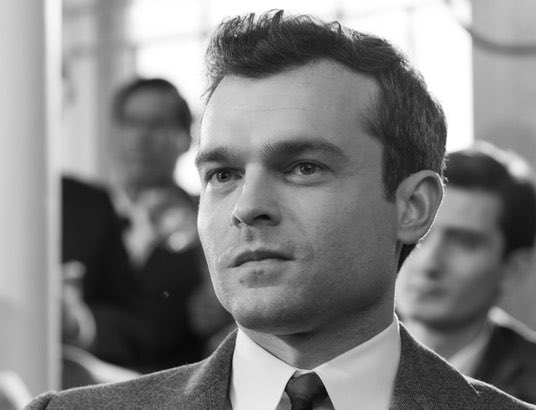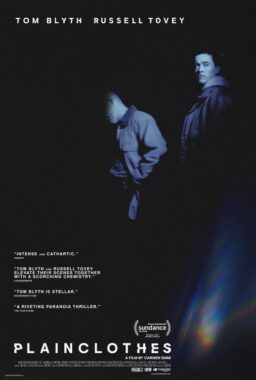How do you pick the best performance in a film defined by literally dozens of them? Christopher Nolan assembled a murderer’s row of talent for “Oppenheimer,” his grand historical drama about the birth of the atomic bomb and the consequences of its power. It contains a veritable smorgasbord of leading icons, character actors, former child star favorites, and faces you forgot you love so much. There’s certainly a case to be made for so many among this ensemble: the steely-eyed determination and rattled conscience of Cillian Murphy in the title role; Robert Downey Jr.’s charisma shattered by the petulance of bureaucratic squabbles; David Krumholtz as the warm friend whose pragmatism punctures his ideals. However, the face you leave the film remembering for days afterward comes from an actor whose character isn’t even given a name.
Alden Ehrenreich plays a Senate aide, a figure who is one of the many government workers standing behind and to the side of the head honchos helping to grease the wheels of power. He has been tasked with guiding Lewis Strauss (Robert Downey Jr.) through Senate confirmation hearings on his nomination as Secretary of Commerce to President Eisenhower’s cabinet. Ehrenreich is essentially a PR guy, a guide for Strauss and the audience through the tangled web of Cold War-era D.C. and the front-stabbing figures who have turned politics into a battlefield. He is, by design, not that important. Dozens of other nameless aides are waiting around the corner to do this job. Ehrenreich just so happens to be there at the right/wrong time.
Being an audience avatar is often a thankless role in any film, and it’s a trope that Nolan often struggles with. Discussions of process and ideas often weigh down his films and inserting a figure of relatable naivety into this risks disrupting the narrative flow. “Oppenheimer” often gets away with not having one during the glut of the story since it’s so heavily focused on conversations about science, ethics, and consequences. The scenes with Strauss and Ehrenreich are a break from this, an insight into a post-Oppenheimer world and how it has impacted the system that helped to create him in the first place. Ehrenreich is not unaware, nor is he expected to play catch-up with Strauss and company. Rather, he’s the constant reminder that scientists did not do what happened at Los Alamos alone. That he is unnamed and a fictional creation of Nolan (a sharp contrast to a film populated by real historical players) hammers home the disposability of such an aide. Ehrenreich’s job is to blend in, to keep a straight face against the peacocking Strauss. It’s a role that could, too, have disappeared into the background, but Ehrenreich knows that the best scene stealers are the ones who react to the carnage.
Ehrenreich, a character actor with the face of a 1950s leading man, has always excelled in parts where he tempers his natural charisma with a dash of something sharper. In “Hail, Caesar!,” he steals the show from one of the Coen Brothers’ starriest casts as Hobie Doyle, the adorably clueless singing cowboy the studio tries to reinvent as a Noel Coward-esque debonair leading man. He’s the safe port of sincerity in a storm of Hollywood cynicism. As the younger brother of the tempestuous Tetro in Francis Ford Coppola’s indie drama, he is appealingly innocent yet imbued with the abrasive arrogance that only a dolt of a teenage boy could truly possess. Even in “Solo: A Star Wars Story,” the u nfairly maligned prequel of the new Disney/Lucasfilm era, Ehrenreich’s Han is less concerned with traditional hero expectations. Audiences seemed furious that he didn’t look or act exactly like Harrison Ford. Still, Ehrenreich understood the giddy enthusiasm of the pre-jaded space cowboy and how the character doesn’t work if he’s always cool (which Ford never was in the original trilogy, something fans often overlook.) The best Ehrenreich performances allow him to dig into humanity’s absurdities and petty mundanities, offering either the freaky flipside or a welcome dose of warmth. It’s never as interesting to be cool when you can be weird, dark, or earnest.
The Senate aide in “Oppenheimer” is clearly used to being the quiet man in the room, the punching bag against whom others launch their egos. His smile is halfway between charm and smarm, with Ehrenreich excelling with those side glances at Strauss as he enters another rant about his battle of attrition with J. Robert Oppenheimer. Everything the aide says feels loaded with subtext, the ruthless efficiency of a worn-down Washington professional. He’s also used to dealing with political players with more bluster than substance, most evident when he has to appease Strauss without rocking the boat. There’s a deadpan quality to him, as though he’s used to being a babysitter more than an advisor. When Strauss reveals his hand and his selfishness thoroughly exposed, Ehrenreich’s subtle reaction most effectively conveys the weight of this moment. It’s not so much that he feels betrayed—he’s clearly too much of a D.C. man to have ever been optimistic—but rather, he’s underwhelmed that years of machinations and supposed patriotism have boiled down to the equivalent of a playground tiff.
And it is Ehrenreich who gets the best line in the film. As Strauss gets ready to face the scrum of ravenous press after the Senate rejects his confirmation, Ehrenreich subtly hides his pleasure but reveals enough to let Strauss know his feelings on the matter. Strauss is consumed by the possibility that Oppenheimer turned the scientific community against him, including Albert Einstein. He repeatedly returns to a perceived conversation between the two that must have made Strauss Einstein’s enemy. Before opening the door to the wolves of the media, Ehrenreich says, “Maybe they were talking about something more important.” Uttered with such casual devastation, the nail in Strauss’ coffin confirms how the world’s fate often means little in the face of one man’s petty grievances. It’s probably for the best that Ehrenreich chose acting as his profession because he would be far too good as a politician.
“Oppenheimer” is, indeed, about far more important things than a politician’s job interview and the concerns of his nameless aide. The Manhattan Project exacerbated humanity’s inevitable self-annihilation, but for rooms full of suits and cigarettes, it was just another day at the office, another tool to be wielded less for destruction than personal bartering. It’s the aide, the one without a name or background or tangible connection to Oppenheimer’s work, who exposes that reality with a crooked smile and killer one-liner. Like a great scene-stealing supporting player, the aide is the one who cuts through the crap to seek the truth. Ehrenreich has long been great at that, and “Oppenheimer” is a welcome new zenith of his career. Here’s hoping there will be many more in the future.











